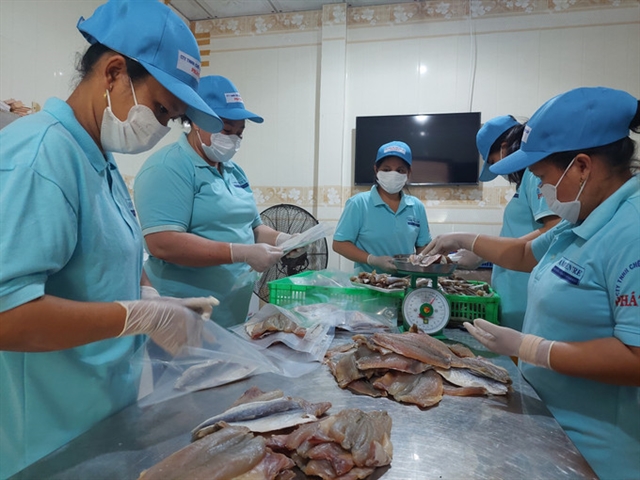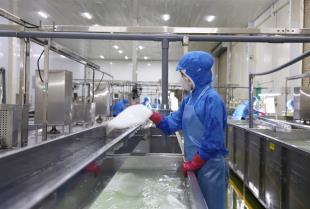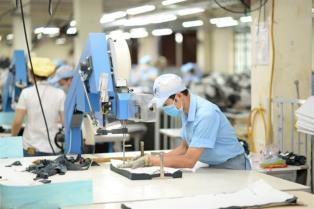The “One Commune, One Product” (OCOP) programme is providing a strong impetus for agricultural transformation in Vĩnh Long Province, helping local producers shift away from fragmented, small-scale operations towards integrated value chains.

VĨNH LONG – The “One Commune, One Product” (OCOP) programme is providing a strong impetus for agricultural transformation in Vĩnh Long Province, helping local producers shift away from fragmented, small-scale operations towards integrated value chains.
With a renewed focus on technology, traceability, and quality improvement, the programme has enabled local specialities to rise in both domestic reputation and export potential.
In Hàm Luông Hamlet, Tân Phú Commune, the Tân Phú Agricultural Cooperative is gradually becoming a model for OCOP-driven development.
With 301 members cultivating 250 hectares of durians, the cooperative has emerged as a key player in upgrading the province’s agricultural products.
According to Nguyễn Thị Thinh, Director of the cooperative, 200 hectares of orchards are now certified under VietGAP standards, with six growing area codes already approved and three others in the process of completion.
The cooperative’s commitment to transparency and good agricultural practice is evident in its detailed recording of farming activities – from tree care to harvest – which ensures traceability and consumer trust.
Farmers have also adopted smart farming techniques through digital transformation projects, including automated irrigation and smartphone-based field monitoring systems.
The cooperative’s durians have received a four-star OCOP certification, marking an important step in building consumer confidence and strengthening domestic and international positioning.
Looking ahead, Tân Phú Cooperative aims to achieve a five-star OCOP rating for its durian product, paving the way for deeper market penetration and eventual export.
OCOP entrepreneurs
A similar transformation is unfolding in coastal Thạnh Phong, where husband-and-wife duo Võ Ngọc Bé and Lương Thị Chung turned their livelihood from shrimp farming into a thriving seafood processing enterprise.
In 2018, they established Phát Huy Seafood Processing Co., Ltd., a company specialising in dried fish and shrimp made from locally sourced marine resources.
With an emphasis on a closed-loop production system and rigorous quality control, the company ensures that its raw materials are free from antibiotics and chemical residues.
Today, Phát Huy Company works closely with traders, fishers, and around 150 aquaculture households across neighbouring communes to maintain a stable supply of raw materials.
According to Bé, the company processes approximately 15 tonnes of seafood each month, yielding about 7 tonnes of dried products for the market.
Among its OCOP-certified products are one-sun dried catfish, red croaker, tilapia, and sand goby fish – three of which hold four-star ratings and one with a three-star rating.
Determined to expand its market reach, the company is integrating digital tools into its production, management, and marketing activities, aligning with OCOP’s forward-looking orientation.
Building sustainable OCOP
According to Lâm Văn Tân, director of the provincial Department of Agriculture and Rural Development, Vĩnh Long now boasts 1,083 OCOP products rated three stars or higher, developed by 625 entities.
Of these products, 13 have achieved five-star status, underscoring the province’s success in nurturing local potential into national pride.
OCOP-certified products benefit from enhanced branding, improved packaging, and greater access to e-commerce platforms — vital tools for meeting today’s demanding market standards.
As consumer expectations evolve, Tân noted, products must meet higher standards of food safety, traceability, and aesthetic appeal.
The OCOP programme has played a critical role in transforming how producers think about their goods, encouraging them to tell the story behind each product, refine its identity, and elevate its competitive edge.
Looking forward, Vĩnh Long is committed to further developing the OCOP ecosystem.
The province will continue to support producers in product documentation, raw material zone development, value chain integration, branding, and skills training.
It will also increase investments in science and innovation, while promoting digital transformation and e-commerce integration.
Through these efforts, Vĩnh Long aims to enhance both the quality and commercial viability of OCOP products.
The province is also investing in upgrading existing OCOP goods — helping those rated three stars progress to four, and four-star products to reach the prestigious five-star threshold.
The overarching goal is clear: to ensure that OCOP products not only preserve local heritage and identity but also become a driving force in rural economic development, capable of standing firm in domestic markets and competing on the global stage.
As of mid-2025, OCOP-related investment and support from local and national programmes in Vĩnh Long has exceeded VNĐ180 billion (approximately US$7 million), reflecting both public commitment and growing producer confidence in the transformative power of the programme. – VNS





